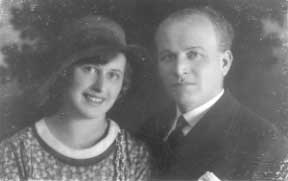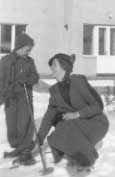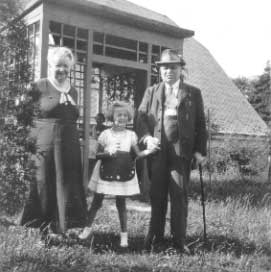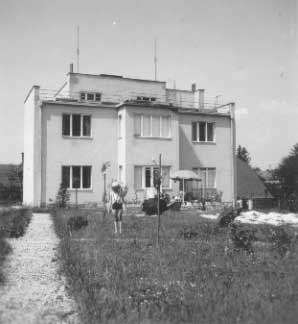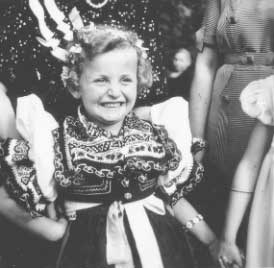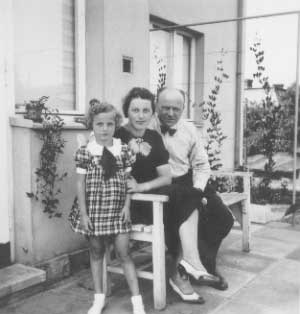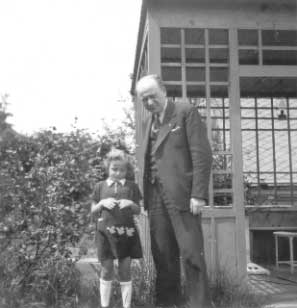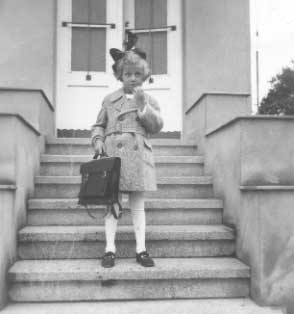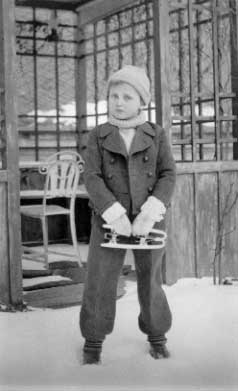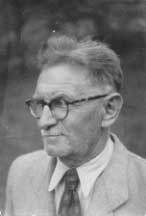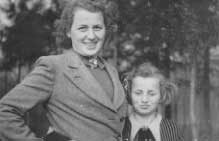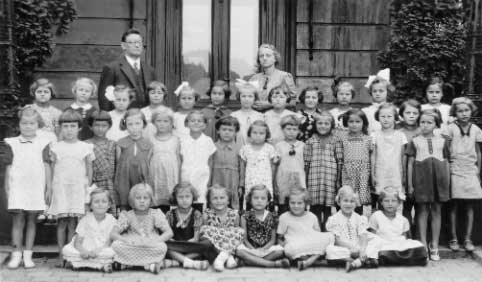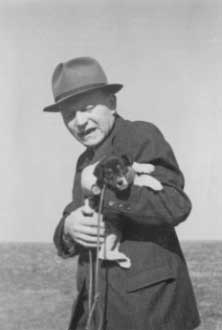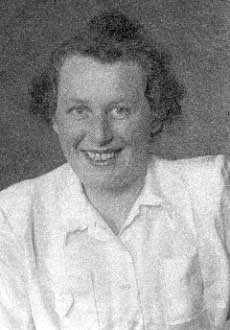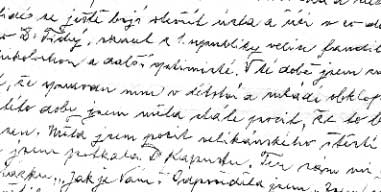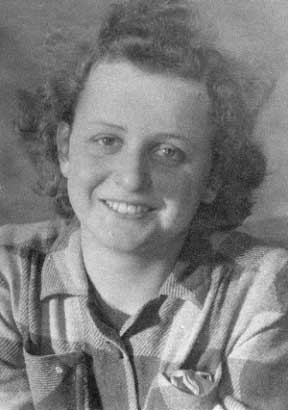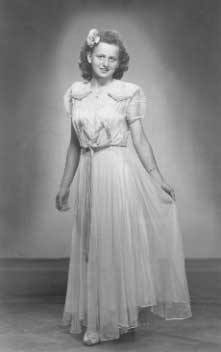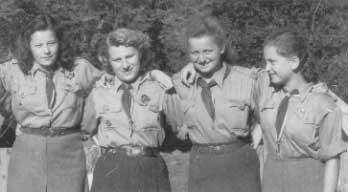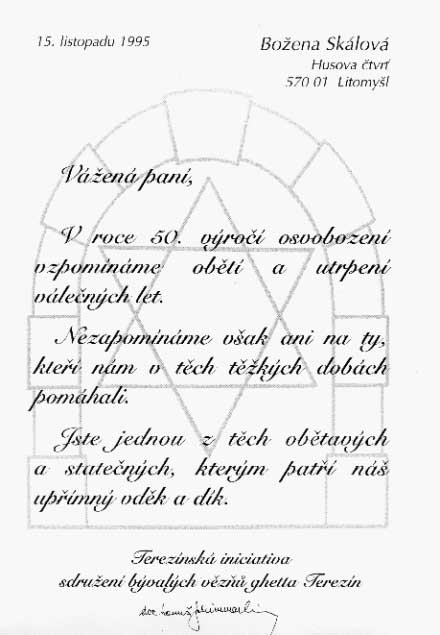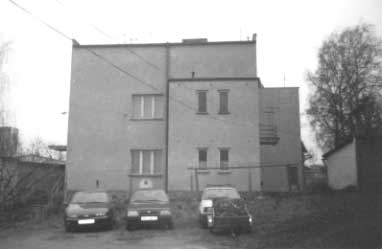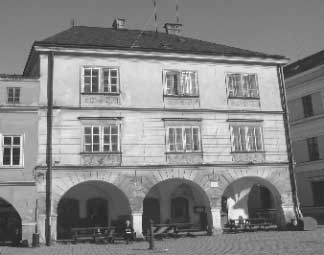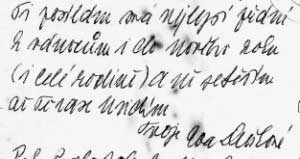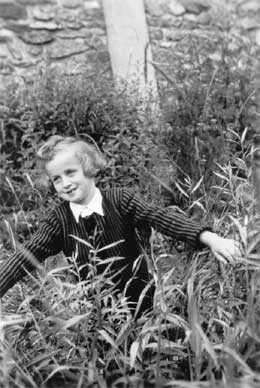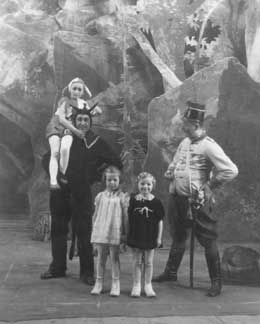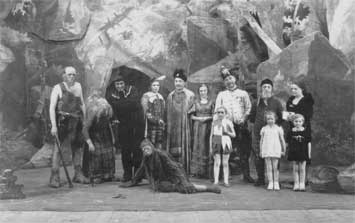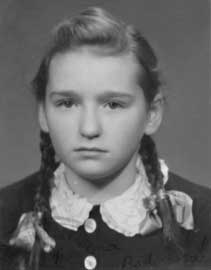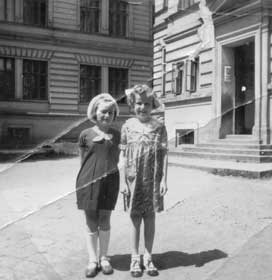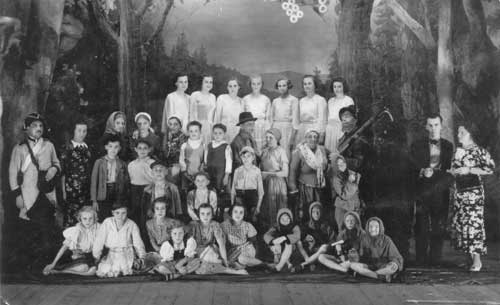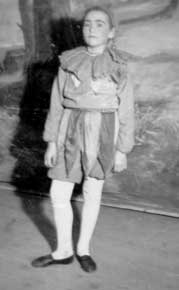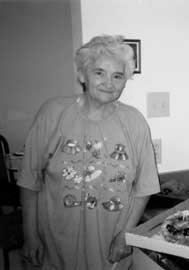The Story of True Friendship
Eva Freyová was born on 23rd March, 1930, in Plzeň. She moved to Litomyšl with her parents in 1934 to live in the house that her grandfather built for his daughters Micie (Sgallová) and Markéta/Margareta (Freyová).
Eva´s father, Viktor Frey, was born on 10th April, 1901. Eva´s mother, Markéta/Margareta Freyová, was born on 27th April, 1909. They met in Litomyšl where Viktor used to visit his grandmother, Mrs. Breitenfeldová, who lived at what is today 113, Smetana Square (the Breitenfelds owned the house and they had a textile shop on the ground floor leading to the square). Later, he would go to see his parents who moved to Litomyšl. The wedding ceremony took place in Litomyšl in May, 1929. They lived in Plzeň for the first years of their married life because Viktor, a mechanical engineer, had a good job in the local Škodovka factory. However, he was made redundant in 1933. Fortunately, he was not unemployed for long. He found a job in the steelworks in Most and he was in charge of canvassing. The firm had three employees for this. One was in charge of business in the Sudetenland, one was in charge of Prague and Viktor was in charge of the rest. Because of his frequent business trips, it was not convenient to live in Plzeň, even if he had had a company car at his disposal. So, the idea of Mr. Finger and Mr. Sgall (Micie´s husband) to build a house in Litomyšl to be shared by both the families appealed to the Freys and they were soon moving in.
Eva was great friends with Anita Fischerová, whose married name was Franková. Their families often got together. With her friend Anita, she went to what is today the Teachers College at 22, Komenský Square, which was called the common training school at that time. Tthe training school was a place where students of the Teachers College, which had a seat in the same building, did their teaching practice. Thirty five children started the first grade in September, 1936. Boženka, whose maiden name was Bartošová and whose married name was Skálová, used to sitting with the first grade pupils. Their teacher was Václav Morávek. They still remember his sense of fairness, which was always evident, even in things which did not seem to be very important. The class was made up of children from rich families, with some of them being extremely rich. So as the other children would not feel ashamed of being poor, he did not accept flowers that had been bought, only those that they had picked themselves. Even today, when talking about V. Morávek, the people in Litomyšl call him "the headmaster". He brought the title with him from the village schools where he had held this position. Despite the fact that he had did not become headmaster in the town for another two decades, the title and respect associated with it stayed with him.
Professor Martínek taught at the Junior School, which was in the same building. Together with another teacher, Mrs. Trefulková, they decided to rehearse a theatre play based on the fairy tale about Paleček. (No, the fairy tale doesn't exist in English. Better just to keep the original Czech in that case). Seven actors were chosen among the children. Mr. Morávek recommended Boženka. She was the smallest of them all and so she was given the role of Palaček, which she was very proud of. That is how her "actor's career" started and she became famous amongst the children. From the third grade, she would regularly go to the amateur dramatics group led by Mr. Novotný and rehearse plays for children. Once, Boženka was supposed to play the role of Punch. She needed black gym shoes, but she did not have any and her parents did not have the money to buy them. Eva helped her - she lent Boženka her own and so Boženka could play the part and Eva was proud that her gym shoes were on the stage. A real friendship developed between the Jewish and Catholic girl.
Božena Skálová (née Bartošová) was born in the same year as Eva - 1930. Her father Antonín, was a cement master and her mother, Marie, was a cook. Boženka had two sisters, Marie and Věra and two brothers, Jaroslav and Antonín. They lived at what is today 721, Jan Žižka Street.
Eva was from "a better family" and an only child. It seemed to Mrs. Skálová, who was much poorer, that her daughter's friend has a lot of things, almost everything she wished for. In spite of this, she was not at all big-headed or bossy. She played the piano and was a good student, but drawing was not her cup of tea. Mrs. Dušková (Eva´s married name) says that once, when she was in second grade, her teacher summoned her father, Mr. Frey, to school offer her help with her drawing at home so that Eva could get a B on her report.
Eva made friends with Boženka very quickly. They often visited each other. They used to play with dolls in the bower in the Freys'garden or play ball or with a skipping rope. They always had something good as a snack, like fancy bread or cocoa. Eva always invited Boženka to her birthday party. Mrs. Skálová remembers that she gave Eva some flowers as a present, probably snowdrops. "Once, I visited Eva on Saturday. They were celebrating the Sabbath," remembers Mrs. Skálová. "There were a lot of people there. The Fingers and the Sgalls for sure. Their son Milan was friends with my brother Tonda. They all spoke German. I did not understand what they were telling me and so Mrs. Freyová translated it for me."
They went to synagogue together. "It was a beautiful place. I remember that the men were wearing hats on their heads and were walking around the altar. Everything was red and gold there," Božena recalls.
In winter Božena used to go sledging in the cherry orchard - an avenue next to the road leading from Litomyšl to Morašice. The children loved to ride their sledges there. Even today, both of them remember clearly how Boženka invited Eva to go there with her. They made one such ride and it knocked the breath right out of Eva. Boženka took her to her parents´house. Boženka´s mother took care of Eva and everything was soon better but she didn't go sledging in the cherry orchard again.
Once, the friends went to fly a kite together. Eva´s kite got stuck in a tree, but a boy climbed up the tree and untangled it. Božena, who was very grateful to him, told him that he could keep the kite, which made Eva very sad.
When the Germans confiscated the house in Kapitána Jaroše Street, they set up NSDAP offices on the first floor and a kindergarten on the ground floor. The Sgalls moved to Havlíčkova Street where they stayed with their granny, Mrs. Sgallová, and the Freys to today's 113, Smetana Square, where they stayed with their granny and grandpa, Mrs. and Mr. Frey.
Eva stopped attending school in 1940. Božena´s mum told her daughter that the Germans had forbidden Jews to go to school and that she should keep going to visit Eva and play with her. "You used to go there before, so you should go there now as well." Boženka considered it normal and so she obeyed. The Freys' flat in the square was entered from the back street, where the saving bank is today. It was on the first floor and reached by a wooden staircase, which creaked a lot and so scared Boženka. She had to visit when it was dark, so nobody would see her.
"They had a large room with a carpet where the whole family gathered. Eva and I played with dolls there and enjoyed various board games. I would also tell her what we were learning at school. I remember old Mr. Frey sitting there in a wicker chair. I was always given a snack there, even though it was during the war and everything was rationed. Mrs. Freyová perhaps used to get food from her neighbours."
Eva was taught at home by a Jew, Věra Štolcová, who had already passed her school-leaving exam.
Eva left for Terezín with her parents on 6th December, 1942, three days later than the other Litomyšl Jews (and all their relatives) because her father was the head of the Jewish Community in Litomyšl and he had some things to see to. Boženka did not hear from Eva for the rest of the war. Her mum probably explained to her why Eva disappeared from Litomyšl, but she can't remember.
The Freys spent three days in Pardubice in a school (until 9th December). They had to hand in their jewellery and watches. Mr. Frey told Eva that they would ask her if she had a watch. "When you say yes, you will have to hand it in. So make up your mind." Eva couldn't lie. She admitted to having a watch and so she lost it. But she was proud to have had the chance to make up her mind herself. Then, they were sent to Bohušovice (on Cg transport, Viktor with the number 199, Eva 200 and Markéta 201) and walked to Terezín carrying their luggage by hand. Eva took a book titled The Beaver River Boys and a doll with her. It was very difficult for her and she felt anxious.
In Terezín, Eva spent the first three days with her parents in "šlojska" (Schleise). Then, they moved her and her mum to the Hamburg Barracks. Markéta worked on three shifts in a laundry. Eva caught scarlet fever and when she was let out of hospital shewasn't sent back to live with the adults. She went to Kinderheim, where she met Anita Fischerová. They were great friends. They differed from the others because they were "mousy". There were a lot of children from an orphanage in their heim, who had different habits and behaved rudely towards Eva and Anita.
To amuse the girls, their wardens used to come up with various activities. One German Jew taught them to draw. Mrs. Dušková recalls that she liked drawing very much. The German woman helped her a lot. She would tell her that she had imagination instead of telling her that she did not have any talent.
Eva also admired Anita´s coat because it had a hood. Once Eva received a parcel (perhaps from the Horký family in Litomyšl) with some lard and sugar in it. Eva spread the lard on a piece of bread, sprinkled it with sugar, and ate it all. Nobody shared their food with the others. She still remembers what a delicacy it was. Anita was very jealous.
Eva´s father and grandfather died at Terezín. Her grandfather, Julius Frey, died in the curfew on 28th April, 1943. Eva´s father often stayed with him because he had a job, which let him enter various buildings. He made use of this and when he managed to get some food from his mum, he brought it to Eva and his father. Once, Viktor caught flu. He didn't do anything about it and it developed into pneumonia. He was ill for 14 months. He died on 23rd June, 1944. Wild roses were just in blossom. Eva picked a bloom and slid it under the lid of the coffin.
Her uncle, František Frey, left for Auschwitz on 20th January, 1943, and Mr. and Mrs. Finger (her grandmother and grandfather) and the Sgalls (her aunt, uncle and cousin) left on the "September transport" on 6th September, 1943. Her grandmother, Hermína Freyová, left on 15th December, 1943.
The fact that Viktor was head of the Jewish Community before deportation protected his wife and daughter until his death. Then, Eva and her mother were sent, on 12th October, 1944 to Auschwitz. Mrs. Dušková thinks they travelled via Dresden. They were on the road for two days and two nights and finally got off next to a ramp. Once the prisoners were standing five abreast they set off marching. While they were standing in Auschwitz, next to the ramp, talking about what was ahead of them, a German passed by. He came up to them and mumbled, "Claim you are older than 16 and younger than 45 and enter your names for hard work." Mrs. Freyová took her father´s coat and put it on Eva so as she would look bigger than she was. This perhaps brought her good luck.
Eva and her mum were at Auschwitz from 14th October to 28th October, 1944. Then they were transported to Lenzing bei Vöcklabruck (a branch of Mauhausen). The journey took three nights and two days. They worked in a factory there. They cleaned machines and, when frost struck, they dug ditches. There were about 500 women in their camp. They were guarded by an woman from the SS called Freulein Breutigam. Once, they heard her talking to somebody saying, "If they work like this for two more weeks, none of them will survive." Eva though wanted to survive because she wanted to take her school-leaving exam at the grammar school in Litomyšl.
When they were not working, she sat down with mother and "cooked". Mrs. Freyová used to say, "You can't put that much food on the table, you'll be sick."
Eva Dušková remembers that one day, a local man came to meet the imprisoned womenm, who were marching back from work five abreast. He handed her an apple. She asked him what his name was. ´Wabringer Dominik´ was his answer. After the war, Eva and her mum tried to find him, but they were not successful.
Once they got an assignment to level compost. The work went smoothly. All of a sudden, Mrs. Freyová saw something white. She grabbed it and pulled it out. It was a little onion and because it was Eva´s birthday that day, she gave it to her as a present.
As the front line got closer, Mrs. Freyová was in a terrible state. She could not even walk and her co-prisoners had to take her to work on a rough stretcher (otherwise she would have been sentenced to death). Eva tried to get some food for her. She knew where it was possible to find potato peelings although it was miles away. When she finally found them, she ate some on her way back and took the rest to her mum. Once, she passed by a building and she felt that people were nodding at her from a distance. She came closer but they told her that they had seen a lot of people begging like her since the morning and they sent her away.
Then, the Americans arrived at the camp, which the Germans had abandoned the day before, on 5th May, 1945. When Eva told her mother that they were free, she answered, "It´s all the same to me." Of all the prisoners, she looked the worst, like a so-called "musulman." She had round eyes, her face was hairy and she weighed 29 kg (Eva weighed 31 kg). The Americans took pictures of her. They gave food to all the prisoners. Mrs. Freyová had to go to a sick bay. Eva was sent, together with the others, to an ex-Hitlerjungend camp on the shore of the Attersee lake. For the first time in many years, they were given plenty of clothes and food.
The first group of rescued prisoners left for home during May. However, Eva and her mother left on 19th June, 1945, because Markéta had been weak for a long time. First, they went by bus to České Budějovice. They stayed there overnight. For dinner, they ate potato-pasta balls, which Eva liked a lot. They also saw German prisoners there. At that time, Eva could not understand why they were being moved and why they did not shoot them dead right away. Then, they went to Prague, where they were examined at a medical centre. Mrs. Freyová was sent to a sanatorium for repatriates in Podolí. Eva stayed with her there for a while. Then, their friends from Dobronice near Mladá Boleslav, came to pick her up from the sanatorium and they took her to Litomyšl at the end of holidays.
When Eva arrivged in Litomyšl, her mum was already there. She was staying with the Filek family in "Bělidla". She had stored her furniture at Mr. Horský´s. She was trying to get her house back. However, the Red Army and later the Youth Union had their headquarters there. Up to this day, there are inscriptions in the Cyrillic alphabet on the walls. In the autumn, when the house was finally empty, Mrs. Freyová and her daughter moved there. At first, they had only a little heater to heat the house, but Markéta was busy looking for the furniture they had stored at people´s houses before the war. Their relatives, set free from Terezín and whom they called "grannies", lived there with them, knitting all the time.
In September, Eva started fourth grade at the grammar school in Litomyšl, where she met Boženka again. She had to take exams, which would prove her knowledge of what her classmates had learned in the previous grades. Her mother hired a Czech language and mathematics teacher for her. Besides that, Eva wanted to do lots of other things. She learnt how to play the piano and the accordion, she studied English with Rector Stříteský, she attended Girl Scouts and she took ceramics and rhythmic gymnastics lessons - probably at the girls school. There, in the dressing room, her group used to change with a group of eight-year old girls. One of them was Mrs. Weissová, née Kroupová. When Eva´s group finished, the little girls were shouting in the dressing room and throwing things at each another. Eva was always hiding in a corner, crying. The other girls thought she was "a bit strange".
Boženka started to visit Eva again all the time. She also made friends with Mrs. Freyová. She used to tell people in the square that Boženka had come to visit her daughter even when it was forbidden. Mrs. Skálová says today, "I did not realize at that time that I was doing something unusual."
Her mother advised Boženka not to ask Eva about anything. "Eva was withdrawn. She was not interested in our girlish conversations and troubles. Once, when we were in the seventh grade, Mr. Faktor, who was our philosophy teacher, started telling us that he had been in a concentration camp. He was describing the conditions in the camp. He was maybe exaggerating or making the story up because Eva stood up and said, ´You don´t have to tell us this, I know what it was like in concentration camp. I spent two and a half years there.´ He never talked about it again."
Mr. Červinka, who tutored Eva in chemistry, warned Eva´s mum that Eva was doing too much. He was tried to talk her out of some things. He said Eva would become a nervous wreck. He was right. Eva passed her school-leaving exam in 1950. First she sat for the Czech language and literature exam. Professor Červinka was there as well. The students chose a topic. Eva chose Czech writers and made a lot of notes while sitting in the ´sweatbox´(a desk where the students prepared before the exam). She was nervous during the exam and she kept crumpling the piece of paper with her notes on. Her teacher did not want Eva to spoil her whole performance with this behaviour and so she took the notes away from her. At that moment, Eva forgot everything. The teacher soon understood what had happened and returned the paper to Eva, but she started to cry bitterly. The Russian teacher brought her water and ordered her to "Drink it!" In the twinkling of an eye, Eva pulled herself together and passed the exam with excellent results.
Having passed her school-leaving exam, Eva left for Prague. She wanted to study psychology, but finally she enrolled for "languages" in the Charles university's Faculty of Arts. She eventually graduated in library science.
Božena got married in 1952 and Eva in 1961. Her husband´s name was Milan Dušek. He is a Catholic. They met on a train when commuting to their jobs in Prague. Eva was from Litomyšl and he was from Ústí nad Orlicí. They have two children (a daughter, Hana, born in 1962 and a son, Petr, born in 1967) and two grandchildren (Hana´s daughter, Terezka, born in 1989 and Petr´s daughter, Kateřinka, born in 2000).
After they left school, Eva and Božena saw each other once every five years at their class reunion. Božena used to visit Mrs. Freyová a lot. She never lost touch with Eva and they gradually saw each other more and more often. Whenever Božena went to Prague, she popped in to see Eva and whenever Eva came to Litomyšl, they spent at least a few moments together. To this day they write and call each other.
When Markéta Freyová died on 10th December, 1992, it was a Friday night. "I had spoken to her on Wednesday," remembers Mrs. Skálová. "She told me she did not feel well and was feeling dizzy, but that she had been getting ready to visit Eva in Prague. Three days after that they found her dead. That day Eva came to see me with her daughter, Hanka, to tell me and to mourn for her with me."
Radka Kulichová
